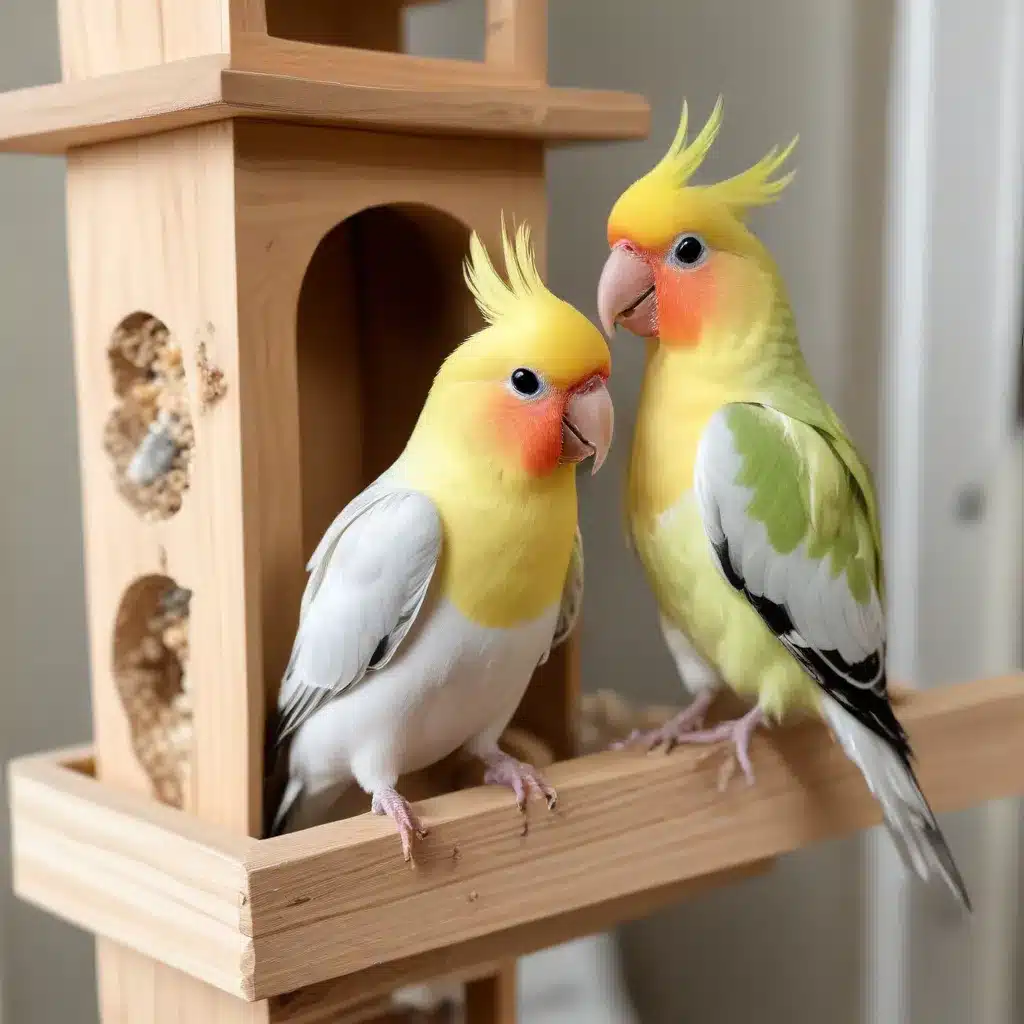
As an experienced avian caretaker, I’ve had the privilege of working with a wide variety of bird species, including the delightful cockatiel. These charismatic companions are not only visually striking, but they also possess unique personalities and specialized care needs. In this comprehensive guide, I’ll share my expertise on crafting the perfect cockatiel habitat – one that not only meets their physical needs but also stimulates their natural behaviors and promotes their overall well-being.
Cockatiel Habitat Design
Enclosure Considerations
Selecting the right cage for your cockatiel is crucial, as it serves as their primary living space. When it comes to cage size, bigger is always better. Cockatiels are active birds that require ample room to move around, stretch their wings, and engage in natural behaviors like climbing, hopping, and flapping. Ideally, the cage should be at least 24 inches wide, 24 inches deep, and 30 inches tall, providing a spacious environment for your feathered friend.
The layout of the cage is just as important as its size. Cockatiels thrive in enclosures with a variety of perching options, including natural wood perches of varying diameters, rope perches, and even platforms. These diverse perching opportunities allow your cockatiel to exercise their feet and claws, and prevent the development of foot and leg issues. Additionally, positioning the perches at different levels encourages your cockatiel to move vertically, simulating their natural climbing behavior.
Enrichment and Stimulation
Keeping your cockatiel mentally and physically engaged is essential for their well-being. Incorporating a variety of toys and activities into their habitat can help prevent boredom and encourage natural behaviors. Foraging opportunities, such as treat-filled puzzle toys or shredding blocks, tap into their innate desire to explore and problem-solve. Mirrors, swings, and ladders can also provide hours of entertainment and exercise.
Remember to rotate and regularly introduce new toys to keep your cockatiel’s environment fresh and exciting. By providing a stimulating and ever-changing habitat, you’ll help reduce stress, promote natural behaviors, and foster a strong bond between you and your feathered companion.
Avian Nutrition
Diet Composition
Cockatiels are omnivores, and their diet should reflect a balance of seeds, pellets, fresh fruits, and vegetables. A high-quality seed mix, supplemented with a variety of nutrient-rich produce, can help ensure your cockatiel receives all the necessary vitamins, minerals, and nutrients they need to thrive.
When selecting a seed mix, look for one that is specifically formulated for cockatiels, as it will provide the appropriate balance of carbohydrates, fats, and proteins. Complement the seed mix with a variety of fresh fruits and vegetables, such as apples, carrots, spinach, and sweet potatoes, to introduce essential vitamins and minerals.
Feeding Practices
Portion control is crucial when it comes to feeding your cockatiel. Overfeeding can lead to obesity and other health issues, while underfeeding can result in malnutrition. As a general guideline, provide your cockatiel with 1-2 tablespoons of seed mix per day, and offer fresh produce in small, bite-sized pieces.
It’s also essential to supplement your cockatiel’s diet with a calcium and vitamin D3 supplement to support their bone health and overall well-being. Consult with an avian veterinarian to determine the appropriate supplementation regimen for your feathered friend.
Cockatiel Behavior
Communication Signals
Cockatiels are highly vocal birds, and understanding their various vocalizations is key to interpreting their needs and emotions. From the familiar “chee-chee-chee” calls to the soft, melodic whistles, each sound conveys a specific message. Paying attention to your cockatiel’s body language, such as raised or lowered crests, can also provide valuable insights into their mood and behavior.
Social Needs
Cockatiels are social creatures and thrive when they can interact with their flock, whether it’s with their human companions or other cockatiels. While some cockatiels may do well as solo pets, others may benefit from the companionship of a fellow cockatiel. When introducing a new bird to your existing cockatiel, it’s crucial to do so slowly and carefully to ensure a harmonious relationship.
For cockatiels that are kept as single pets, regular interaction and bonding time with their human caretakers can help fulfill their social needs. Engaging in activities like target training, step-up training, and supervised out-of-cage time can help strengthen the bond between you and your feathered friend.
Cockatiel Health and Wellness
Common Health Concerns
As with any pet, it’s essential to be aware of the common health issues that can affect cockatiels. Respiratory problems, such as pneumonia and aspergillosis, can be a concern, particularly in poorly ventilated or overcrowded environments. Feather plucking, a behavior in which the cockatiel pulls out their own feathers, can also be a sign of an underlying issue, such as stress, boredom, or nutritional deficiencies.
Preventive Care
Regular veterinary checkups are crucial for maintaining your cockatiel’s health and catching any potential issues early. During these visits, your avian veterinarian can perform a comprehensive physical examination, provide preventive care like parasite treatments, and offer guidance on proper husbandry and nutrition.
Grooming is another important aspect of cockatiel care. Regularly trimming your cockatiel’s nails and wings can help prevent injury and keep them safe within their habitat. Additionally, providing a dust bath or misting your cockatiel with water can help maintain the health and integrity of their feathers.
By prioritizing your cockatiel’s habitat design, nutrition, behavior, and preventive care, you can create a comfortable and engaging living space that supports their overall well-being. Remember, every cockatiel is unique, so be attentive to your feathered friend’s individual needs and preferences. For more information and resources, be sure to visit Mika Birds Farm – a trusted source for avian enthusiasts.


